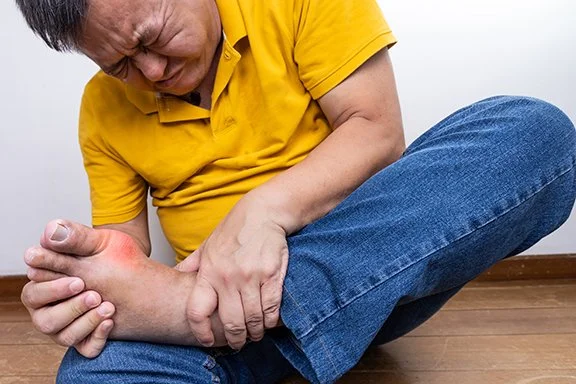Festive Feasting and Gout
At NY Foot Health, we know part of celebrating the holidays is enjoying delicious foods at family dinners and parties with friends and co-workers. That plays a role in the increase in the number of gout cases that many podiatrists see at this time of the year. What’s the connection?
Gout 101
Gout is a form of arthritis and perhaps the most painful type. A buildup of uric acid—a chemical typically found in the body and a byproduct of the breakdown of certain foods—is responsible for gout. When the uric acid crystallizes in a joint, it causes excruciating pain, swelling, redness, and heat around the joint. It also severely limits the range of motion in the joint. The most common site of gout is the big toe. It is because uric acid crystallizes more readily under cooler temperatures and the big toe being farthest from the heart is the coldest part of the body. Men ages 40-60 suffer from gout the most, but it can affect women and men of other ages.
Gout Attack Triggers
Several foods and beverages result in an increase in uric acid in the body, and many of them are on holiday menus. These include shellfish, red meat, rich sauces, red wine, and brandy. Other foods, such as lentils and beans, may also trigger an attack.
In addition to diet, other factors may put you at higher risk for gout. These include having diabetes or high blood pressure, obesity, stress, surgery, chemotherapy, and taking certain medications and vitamins.
Getting Relief
If you suffer a gout attack, your podiatrist can help you track down what may have triggered it. If you don’t currently have a podiatrist, you can find one through our online directory. The foot doctor will examine the affected joint and get a complete medical history. There is some evidence that the tendency for gout may be inherited. Laboratory and imaging tests may also be ordered to rule out other conditions.
If gout is the confirmed diagnosis, the foot doctor may prescribe medications to ease the pain and swelling and suggest that you rest and elevate the affected foot above your heart. If gout is a recurring problem, the foot doctor may recommend dietary changes and preventive medications to help prevent future attacks.
To learn more about podiatric conditions, contact us and subscribe to our free e-newsletter.

